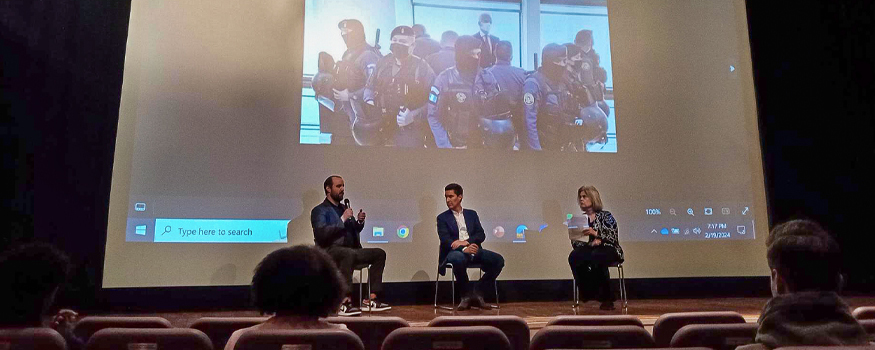By Caroline Val
José Rubén Zamora is a Guatemalan journalist, publisher, and founder of three newspapers who has exposed political corruption in his country for two decades. A University of Miami panel discussed his case, and the state of press freedom in Guatemala and Latin America.
For more than two decades, José Rubén Zamora has fearlessly pursued investigative reporting in his homeland of Guatemala, shining a light on corruption and injustices within the Central American country’s government.
Now, the 67-year-old journalist finds himself ensnared in a web of alleged fabricated charges and government oppression, with his case most recently being discussed at the University of Miami.
Zamora, the esteemed founder of Guatemalan publications including el Periódico, Siglo Veintiuno, and Nuestro Diario, has endured more than 570 days behind bars due to dubious allegations of money laundering brought on by the previous Guatemalan president, Alejandro Giammattei, and his administration. The charges, widely denounced as politically motivated, stem from a $40,000 donation received by the newspaper from an anonymous donor.
Instead of being recognized as a lifeline for independent journalism in the region, the contribution was twisted by Guatemalan prosecutors to portray Zamora as a perpetrator of corruption himself.
In a panel discussion held Monday at the Bill Cosford Cinema, Zamora’s son, José Carlos Zamora, U.S. Rep. Norma Torres, D-CA, and Reporters Without Borders (RSF) executive director Clayton Weimers shed light on the systematic harassment faced by journalists critical of the government in Guatemala and throughout Latin America as a whole. The event was hosted by Sallie Hughes, professor and chair of the Department of Journalism and Media Management in the School of Communication, and Gregory Koger, professor of political science and director of the George P. Hanley Democracy Center in the College of Arts and Sciences.
“I became interested in this case because I saw this injustice,” said Torres, who is also a Guatemalan American. “We have a responsibility [to be involved in cases of press freedom], not only in other countries but to the U.S. taxpayer, as we are investing billions of dollars in helping to save lives around the world.”
According to Zamora’s son, the oppressive tactics used against journalists like his father have grown increasingly sophisticated in the region. From targeted audits to baseless criminal charges, the authorities under former Giammattei have steadily sought to muzzle dissent and scrutiny from the press, he said.
“They really had three objectives with his imprisonment. One was to punish him directly,” Zamora explained to the audience. “Second, they wanted to ensure that el Periódico shut down, which eventually after a year, they managed to do. But most importantly, they wanted to send a message to all journalists in Guatemala—that doing journalism is a crime. If they could come after my father, who had this trajectory and international recognition, that they can really come after anybody.”
When first imprisoned, Zamora had little to no liberties, even spending up to 23 hours a day in solitary confinement. Zamora’s son, who mentioned there had even been an assassination attempt against his father prior to his imprisonment, detailed how the past year has been harder for the family emotionally because of the uncertainty his father faces.
However, with the election of President Bernardo Arévalo and the ushering in of his new administration, the journalist has been given more accommodations as his family and the international journalism community continue the fight to release him.
These efforts, according to RSF’s website, have included circulating a petition which has generated nearly 11,000 signatures, frequent trips to Guatemala for hearings on Zamora’s case, and publicizing the case as much as possible through connections with journalists all over the world—and the use of the hashtag #FreeZamora on social media.
“We have colleagues in four different countries who are actively working on this case right now,” Weimers said during the panel discussion. “That work falls into two buckets broadly, where one is public visibility in doing events like this and having an official champion in Congress that is regularly on Zamora’s case. But also, governments like Guatemala care deeply about reputation, and any act of shaming in this respect is good because it harms their international standing when they’re trying to make progress.”
The next hearing in relation to Zamora’s case is set to take place on Feb. 21, where his son, extended family, and RSF representatives aim to ask for any new charges developed against Zamora to be dropped and for him to be transferred to house arrest. While Zamora’s son expressed that he believes this effort might be unsuccessful, despite his father meeting the criteria for both actions, he is hopeful that there may be some changes given the new administration has less of a grip on the judges overseeing his father’s case.
“It’s been difficult and it’s easy to see the very bad forces behind all of this, but it’s also been incredible and very hopeful seeing the good,” Zamora’s son said. “There’s been a lot of solidarity, working with RSF and all these press freedom organizations. There’s so much support and that has been very powerful to witness.”







